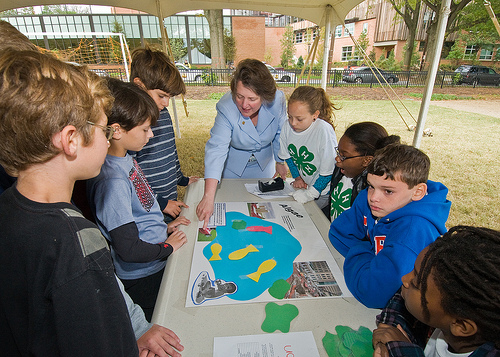
About the Afterschool Science Networks Study
The Afterschool Science Networks (ASN) project at SRI International is a five-year research study focused on science in afterschool settings funded by the National Science Foundation. This study is the most comprehensive study, to date, of a state-wide afterschool program.
The study examines publicly-funded elementary school grantees of California's Afterschool Education and Safety (ASES) program. California's afterschool context is a rich environment for this study, since it offers diverse demographics, as well as strong and consistent funding. Proposition 49, approved by California voters in 2002, provides more than $500 million in funding each year for afterschool programming. Because of this investment, California has extensive afterschool funding and accompanying infrastructure. The more than 4,500 ASES afterschool sites serve children from public schools where 50% or more students are eligible for free or reduced-price lunch.
The project explores:
- The types and quality of science offerings within afterschool programs, including the science curricula and materials used in these programs.
- The connections between afterschool programs and support organizations like science museums and technical assistance providers.
- The types of connections, or networks, that may support the delivery of high-quality afterschool programming and the dissemination of high-quality informal science curricula and materials.
"The larger goal of the study is to create new knowledge that helps afterschool and informal science stakeholders improve programs and broaden their impact," said principal investigator Barbara Means, Ph.D., Director of the Center for Technology in Learning, SRI International.
SRI is working in collaboration with the California Afterschool Network and our partners, Joseph Ames and Steve Fowler, on this research. Inverness Research is providing independent evaluation of the project. Findings from the study will be disseminated to practitioners, intermediaries, policymakers, and funders and others with an interest in improving the quality of informal science and afterschool learning.
To learn more about the study, watch this short video:
Study Components
| Program Survey | Gathered information regarding science offerings, science materials, and partnership. Sampled to represent ASES programs (n=410). (2010-11) |
| Case Studies | Observed science offerings and interviewed staff, site coordinator and partners. Sampled for programs with rich and frequent science offerings (n=9). (2011-12) |
| Support Partner Survey | Interviewed or surveyed all available organizations named by sites as science partners regarding the supports they provide (n=61). (2012) |
| Instructional Materials Analysis | Examined the materials sites use for science, focusing on the support features included in different types of materials. (2013-14) |
| Social Network Analysis | Used SNA to examine connections among sites, their partners, and the partners of partners. (2013-14) |
This project is funded by the National Science Foundation under NSF grant number DRL-0917536. See our research partners.


